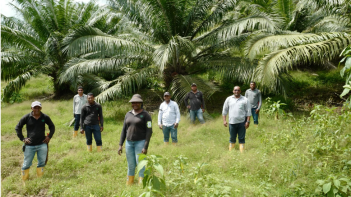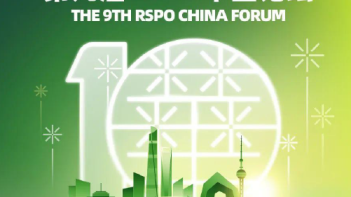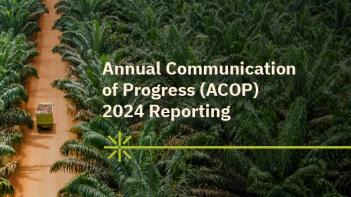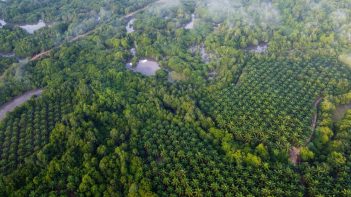Sustainable palm oil conversations are gaining momentum in India during this ‘new normal’ phase triggered by the COVID-19 pandemic. RSPO, in collaboration with our partners and members – the Centre for Responsible Business, The Better India, the World Wide Fund for Nature (WWF)-India, and Youth for Sustainability India – successfully hosted the second Sustainable Palm Oil Dialogue (SPOD) India from 29 – 31 October 2020.
The event attracted over 300 businesses, civil society organisations, and youth representatives to engage in fruitful and solution-oriented conversations on sustainable palm oil, with a focus on RSPO’s shared responsibility principles.
RSPO was also a lead partner for the ‘India and Sustainability Standards Conference 2020’, concurrently held from 28-30 October, which also hosted two SPOD India sessions. RSPO’s Chief Executive Officer-Designate, Beverley Postma, who delivered welcome remarks at the event, said, “with our ongoing work on Certified Sustainable Palm Oil (CSPO) production in India, we are hearing from the oil palm farmers that, given the market connectivity and financial incentives, they would prefer to be a part of a sustainable and regenerative agriculture system.”
Several businesses have highlighted the urgency and opportunity that comes along with shared responsibilities. It’s a collaborative and joint process by think tanks, governments, policymakers, and citizen groups to make the switch to sustainability. The process must involve all stakeholders, which will help us to come to a pathway to CSPO.
According to Golden Agri-Resources Senior Vice-President of Group Corporate Communications, Anita Neville, “There is a growing middle class in India that is becoming more educated and attuned to sustainability issues. This is an opportunity for growers and sellers of palm oil. However, the industry on its own cannot mainstream certified sustainable palm oil production and trade. There’s a big role for civil society organisations (CSOs) and governments to play.”
Every great idea requires a solid policy intervention from governments. In order to push for sustainability in consumer goods, India would need a strong and robust policy.
Ilse Van Dijl, Attaché for Agriculture, Nature and Food Quality India and Sri Lanka, Embassy of the Kingdom of the Netherlands in New Delhi, commented that India has a big leverage in playing a leading role in transforming the global market for sustainable palm oil, as the biggest importer of palm oil globally. She suggested a ‘Delhi Declaration’ to encourage the import and production of sustainable edible oils, including palm oil, and that a key factor to make this happen is to convene all the relevant stakeholders through dialogues like this and build consensus.
Other business leaders also shared how they are listening to their customers, and creating sustainability policies. The session clearly laid out that businesses must listen and respond to what consumers want – not just a good product, but a clean and sustainable supply chain.
Sustainability Director of Procter & Gamble, Girish Deshpande, said, “Fast moving consumer goods (FMCG) companies should not only commit to profit but also to the planet and the people. From a supply chain perspective, they should understand where their supply comes from and what are the risks involved. At the end of the day, what drives P&G is not investors but consumers.”
What stood out clearly is that educating consumers on ethical supply chains is necessary, and that’s where consumer awareness campaigns become vital.
Bhavna Prasad, WWF India Director of Sustainable Business, explained that, in terms of productivity, oil palm is 4-10 times better than other oil crops and it is more versatile. Palm oil in itself is not the problem but the way it is generally produced is.
Youth are also a key driver of change for mainstreaming sustainability and circular economy. Young people in the age group of 15-24 are taking the lead. Padma Parija, a volunteer for Youth for Sustainability India, stressed on the value of biodiversity, indigenous communities, and habitats. “As consumers, we must ask the question – where are the ingredients and raw materials sourced from? For effective action, we need more and more educational initiatives for consumers, such as the #KnowYourPalm campaign,” commented Padma.
During SPOD India 2020, a business guide for companies titled ‘How to Transition to Sustainable Palm Oil’, which was developed by the End Users Working Group of I-SPOC and RSPO, was also launched. To get a copy of the guide, kindly contact RSPO’s India Representative, Kamal Prakash Seth at [email protected].
Keep reading

Latin American Smallholders, Key Global Brands Gather in Peruvian Amazon to Advance Sustainable Palm Oil

RSPO Forum for Members and Certification Bodies 2025: Strengthening Capacities and Building Bridges with RSPO Members

From Violence to Prosperity: Cultivating Sustainable Palm Oil in San Pablo, Colombia

Palmas de Tumaco: Enduring, Trusting, and Transforming in Colombia’s Pacific Coast
Carry Over Credits for Certified Independent Smallholder Groups

From the Amazon to the Aisles: Discovering Sustainable Palm Oil in the Heart of Peru

Global Trends of Sustainable Palm Oil and China's Pathway

Final list of ACOP 2024 Non Submitters




